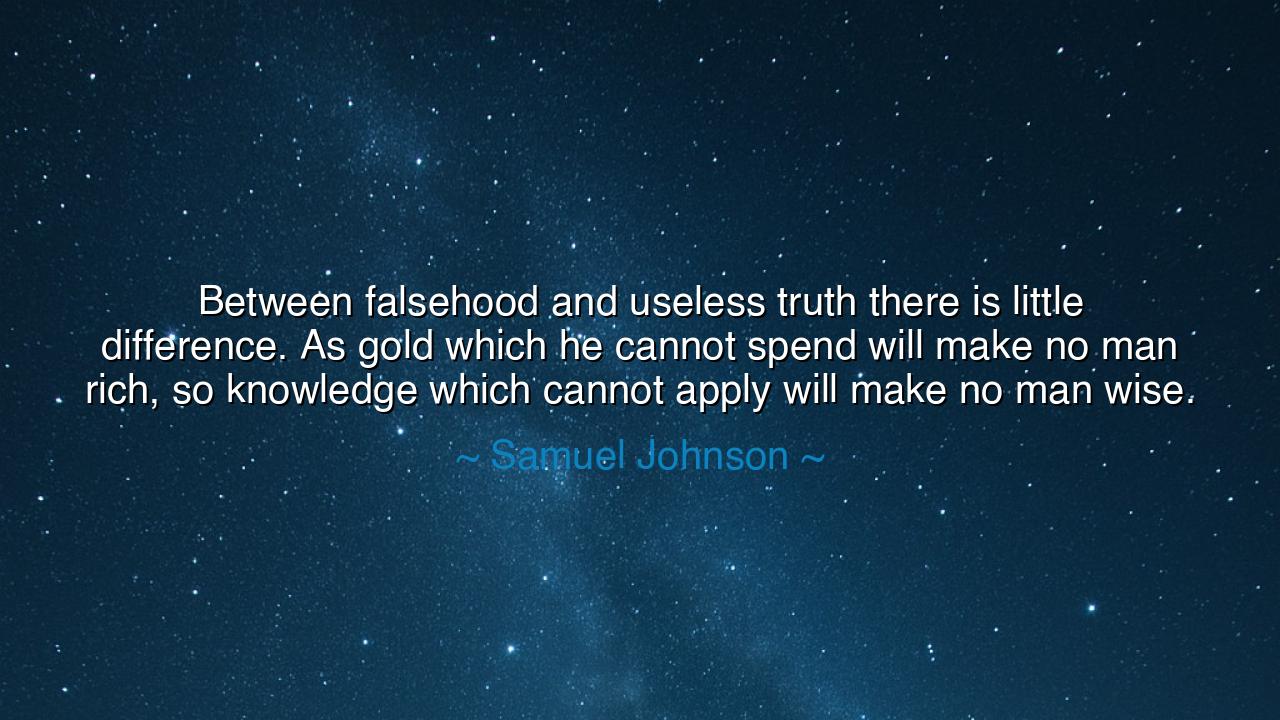
Between falsehood and useless truth there is little difference.
Between falsehood and useless truth there is little difference. As gold which he cannot spend will make no man rich, so knowledge which cannot apply will make no man wise.






In the profound words of Samuel Johnson, we hear a truth that cuts through the vanity of intellect and the illusions of pride: “Between falsehood and useless truth there is little difference. As gold which he cannot spend will make no man rich, so knowledge which cannot apply will make no man wise.” In this declaration, Johnson speaks not as a scholar of books, but as a sage of life — reminding us that truth without purpose is but an ornament, and knowledge without action is as barren as a desert of words. He calls upon all seekers of wisdom to understand that knowing is not the end of learning, but the beginning of living.
To grasp the origin of this saying, we must look to Johnson himself — a man of towering intellect and moral depth, who lived in eighteenth-century England, an age drunk on reason and discovery. Scholars filled libraries with facts, but few understood the meaning behind them. Johnson saw the danger of a generation that worshipped knowledge but forgot its purpose. His quote, drawn from his essays and reflections, was a warning to those who mistook information for wisdom. For him, truth was sacred — but only when it served the betterment of the soul and the world. A truth unused, he warned, becomes indistinguishable from a lie, for both leave reality unchanged.
In comparing truth to gold, Johnson paints a vivid image of the human condition. A man may hoard gold and still die poor if he never dares to use it. Likewise, one may hoard knowledge — scriptures, sciences, philosophies — and yet remain ignorant of how to live. The value of both wealth and wisdom lies not in their possession, but in their application. The miser who hides his gold is not rich; the scholar who hides behind his books is not wise. For the true worth of knowledge is proven only when it is given — when it becomes counsel, kindness, justice, or creation. Knowledge that remains idle is like a lamp never lit — beautiful in form, but useless in darkness.
History itself is a long testimony to this truth. Consider the scholars of Alexandria, whose great library once held the knowledge of the ancient world. Within its walls were scrolls on astronomy, philosophy, medicine, and law — the collective mind of civilizations. Yet when fire consumed that library, much of that knowledge perished, not because it was false, but because too much of it had never been lived. The truths locked in parchment had not yet become part of the world’s pulse. Johnson’s warning resounds through that ruin: knowledge that is not shared, practiced, or embodied is as fragile as smoke — it vanishes, leaving no trace of wisdom behind.
The same lesson echoes in the life of Leonardo da Vinci, the master whose notebooks brimmed with inventions centuries ahead of their time — flying machines, hydraulic systems, war engines, and anatomical sketches of unmatched precision. Yet many of his designs never left the page. The world, in his time, was not ready, and so his genius slumbered in ink. His knowledge was pure gold, but unspent. It was only when later generations applied his insights that his ideas transformed civilization. Thus, the wisdom of Johnson’s words transcends even his own century: knowledge must be translated into action, or it remains a dream unrealized.
The meaning of Johnson’s teaching is therefore both practical and spiritual. He tells us that truth must serve life. A truth that makes no one kinder, braver, or freer is but an echo, not a revelation. The scholar who studies virtue but practices none is no better than the liar who denies it. For the soul, like the body, must labor to grow strong. To learn the truth and not live by it is to feed the mind but starve the heart. Wisdom is born not in the accumulation of ideas, but in their embodiment — when thought becomes deed, and understanding becomes compassion.
The lesson for us, children of a world overflowing with information, is more urgent than ever. We live in an age where knowledge multiplies, but wisdom dwindles. We read endlessly, yet act little. We speak of truth, yet rarely live it. Johnson’s words call us back to balance: to learn for the sake of goodness, not pride; to seek truth not for possession, but for transformation. If we know what is right and fail to do it, our knowledge condemns us. But if we live what we learn — if we turn thought into service, and insight into love — then knowledge becomes power, and truth becomes light.
So remember this, dear listener: truth is not a treasure to be stored, but a flame to be shared. Let your learning become living, and your wisdom become work. Do not settle for the comfort of knowing — dare to apply what you know, to heal, to teach, to build, to forgive. For as Johnson said, falsehood and useless truth are kin, and only in action does the soul prove itself alive. Knowledge that moves the world is knowledge made flesh — and in that union of thought and deed, humanity finds its highest form of wisdom.






AAdministratorAdministrator
Welcome, honored guests. Please leave a comment, we will respond soon